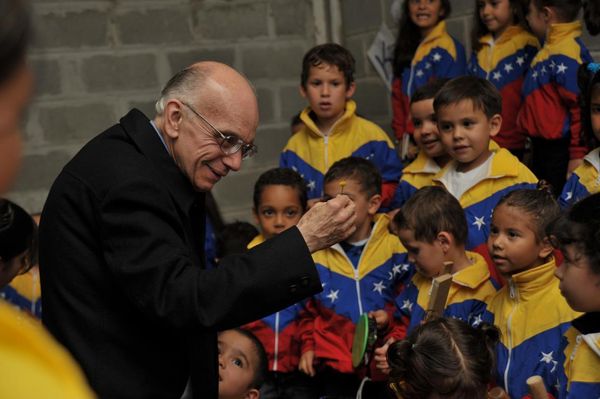
By Abreu Fellow, Jose-Luis Hernandez-Estrada
New England Conservatory, Boston, MA
Music is instrumental for the pursuit of happiness. It brings people together to discover the virtues of discipline and generosity; and to realize new realms of possibility.
José Antonio Abreu, the founder of El Sistema, the celebrated national network of youth orchestral programs founded in Venezuela in the late 1970’s believes in the arts as an agent for social change. His work, considered one of the “world’s cultural treasures,” is a proven model for the role of classical music in our times.
For over 36-years, Maestro Abreu has dedicated his life to bringing music to those who need it the most. He is credited with creating new paradigms in music education that have quietly produced profound social transformations throughout his native country, impacting an entire nation and continent with a message of hope and conciliation through music. He has put the fine arts at hands-reach and in the hearts of thousands of children, families, and educators who have chosen to believe in music and its enduring values. The maestro explains, "music has to be recognized as an agent of social development in the highest sense, because it transmits the highest values—solidarity, harmony, mutual compassion.”
Abreu contends that through the collective exercise of music, young people can readily overcome the obstacles of material poverty, and thus enter into a sphere of moral growth that guides their deepest aspirations in the spirit of excellence and progress. When a child learns to play and sing together in an orchestra or choir, she also learns about collective discipline, about embracing joy; and committing to a productive life filled with beauty and harmony.
Abreu’s El Sistema is not by any means a “system” in the sense of strictly focusing on specific pedagogical methodologies or theories. It is a window into the art and nature of possibility; a network where young people, families, and communities come together to experience the values of music in nurturing and non-competitive environments; and where teaching artists envision their profession as an instrument for meaningful social transformations. Its primordial goal is not to produce young instrumental virtuosos, but citizens of virtue instead.
As a social development strategist, Abreu has centered his cultural policies for the benefit of those youth who are most vulnerable to falling into the traps of life in the barrios. The maestro often says that “if you put an instrument in the hands of a child, he will never pick-up a gun.” In inviting youth to experience music a method for the prevention of wrongdoing is instilled early in a child’s life. Abreu wants to reach one million of those children throughout his native Venezuela in the next ten years.
A few years ago, when I heard Gustavo Dudamel and the Simon Bolivar Youth Orchestra (the flagship El Sistema orchestra) perform in Monterrey, Mexico, I was immediately captivated by my fellow musician’s devotion for music. As we experienced the dazzling rhythmic syncopations in Silvestre Revueltas’ Sensemaya, we were also invited to ponder a new realm of possibility. The orchestra’s astonishing display of collective virtuosity reminded us that working together in the pursuit of common goals is a beautiful idea. Tocar y Luchar is a familiar motto among Venezuelan musicians—aspiring for excellence together, nothing is impossible.
Indeed, orchestras can serve as a transcendental instrument for social consonance and transformation. Maestro Abreu describes orchestral practice as a metaphor for an inclusive and democratic society. "An orchestra is a community that comes together with the fundamental objective of agreeing with itself, therefore, those who play a part in the orchestra, begin to live the experience of agreement," he says.
In an orchestra, participants blossom through teamwork and cooperation, understanding music as an entity that binds them together and propels them to new spheres of possibility and achievement. That very sense of awareness of a community of practice inspires young people to believe in themselves, model the intrinsic values of music, and enact social change everywhere around them.
Maestro Abreu has inspired a world-wide movement that is reclaiming music education as a universal right. In the United States, more than 50 El Sistema-inspired educational initiatives are already in place and constantly evolving. Music educators across the country have become re-energized and compelled to help bring back music education to our public schools. Orchestras are constantly thinking about how they can best meet the needs of the communities they serve. At the New England Conservatory, students and faculty are pursuing musical excellence while serving as advocates for community and social justice. Together, we are reshaping the role of music in society and in the twenty-first century.
An enduring message of hope is ever-present in music and in the ethos of El Sistema. You can hear it in south Los Angeles as young orchestral musicians share their joy for music; and in Brighton, as children help each other with their instrumental parts. During my tenure as music director of an orchestral núcleo in one of Mexico’s most violent cities, Abreu’s vision of social transformation through music resonated strongly within our community. As we rallied behind our youth orchestra, music allowed us to recognize that amid dire circumstances, it was still possible to dream big and achieve success.
Music is universal and is for everyone. In these challenging times, as violence and materialism seeks to entice the aspirations of our youth, let us turn to music. Let us support and allow music education to shine its radiant light upon our communities so that we may prosper—so that young people may find enduring beauty and happiness in their everyday lives.
-
Dvorak: Symphony No. 9 "From The New World": IV Allegro con fuoco (Live Performance with OSSBV) 13:550:00/13:55
-
0:00/8:58
-
0:00/10:43
-
0:00/4:30
-
Chavez: Inocencia 3:280:00/3:28


